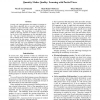Free Online Productivity Tools
i2Speak
i2Symbol
i2OCR
iTex2Img
iWeb2Print
iWeb2Shot
i2Type
iPdf2Split
iPdf2Merge
i2Bopomofo
i2Arabic
i2Style
i2Image
i2PDF
iLatex2Rtf
Sci2ools
AAAI
2011
2011
Quantity Makes Quality: Learning with Partial Views
In many real world applications, the number of examples to learn from is plentiful, but we can only obtain limited information on each individual example. We study the possibilities of efficient, provably correct, large-scale learning in such settings. The main theme we would like to establish is that large amounts of examples can compensate for the lack of full information on each individual example. The type of partial information we consider can be due to inherent noise or from constraints on the type of interaction with the data source. In particular, we describe and analyze algorithms for budgeted learning, in which the learner can only view a few attributes of each training example (Cesa-Bianchi, Shalev-Shwartz, and Shamir 2010a; 2010c), and algorithms for learning kernel-based predictors, when individual examples are corrupted by random noise (Cesa-Bianchi, Shalev-Shwartz, and Shamir 2010b).
2010b | AAAI 2011 | Intelligent Agents | Shalev | Shwartz |
Related Content
| Added | 12 Dec 2011 |
| Updated | 12 Dec 2011 |
| Type | Journal |
| Year | 2011 |
| Where | AAAI |
| Authors | Nicolò Cesa-Bianchi, Shai Shalev-Shwartz, Ohad Shamir |
Comments (0)

